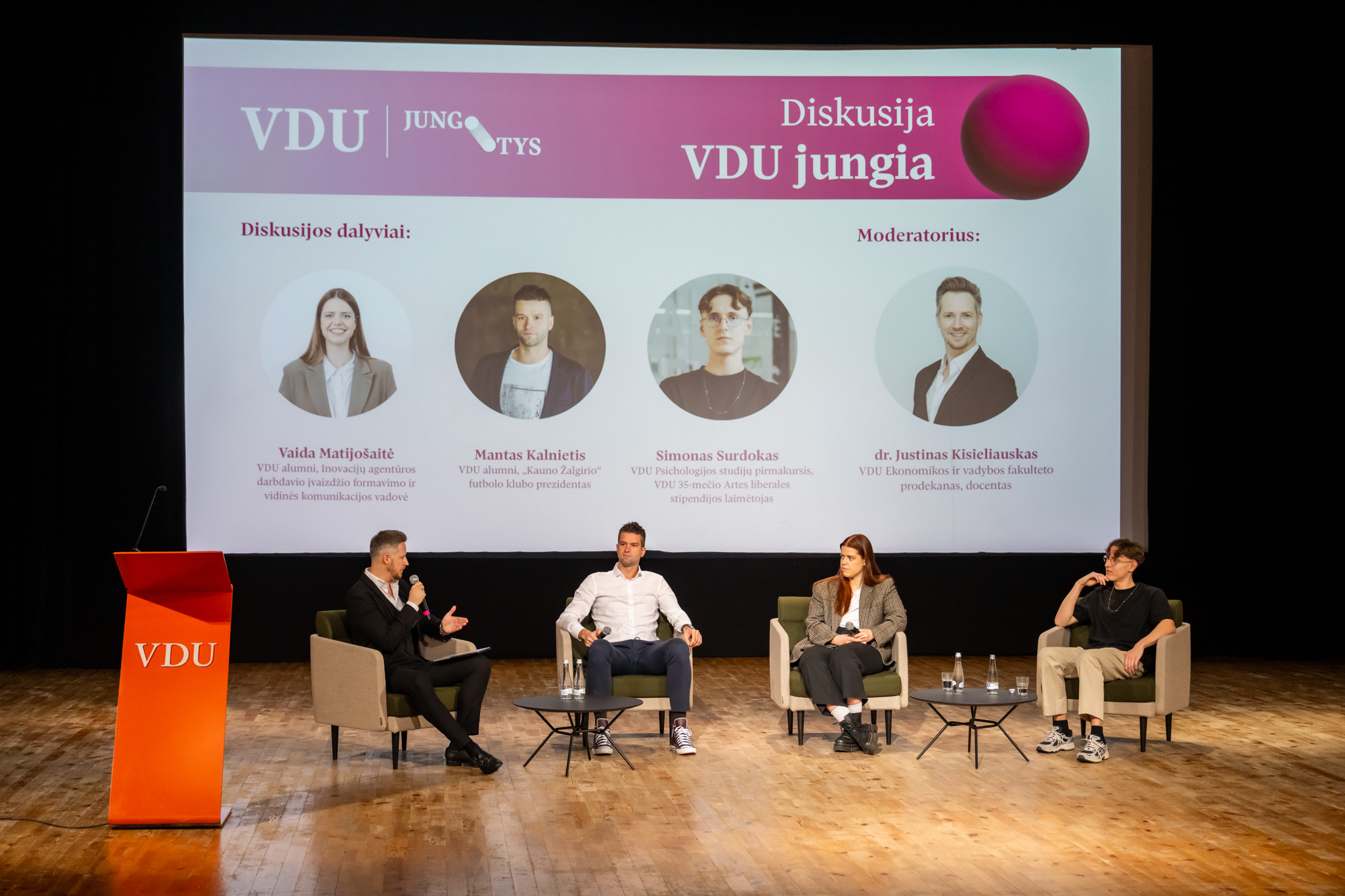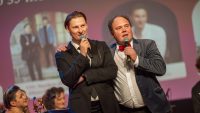At the University, Each of Us Is a Part of Connections

On 8 November, Vytautas Magnus University (VMU) hosted a unique event that brought together hundreds of people – pupils from across Lithuania, VMU students, teachers, and alumni participated in various lectures, presentations, job interviews, discussions, and a concert. Titled “VMU Connections,” the event provided a platform for attendees to meet, interact, and share knowledge, experiences, and career opportunities.
Unity and cooperation essential for Lithuania
“The world has changed. Due to the increased pace, technological advancement, and, ultimately, a decreasing population in Lithuania, we need to start living more communally. Communication with universities and businesses should begin while still at school,” said VMU Rector Prof. Juozas Augutis in his welcome speech during the event opening. According to him, it is crucial now to understand that the times when a person’s life was divided into distinct stages – school, university, and work – are over.
“Although the University hosts many large events, this is the first time we have managed to bring everyone together in one place in such a concentrated way. VMU students, teachers, alumni, pupils from all over Lithuania, and representatives of businesses and organisations form that unity and cooperation that is so essential for Lithuania. I am convinced that this is the beginning of a long tradition,” said the Rector of VMU.
The event opened with a discussion titled “VMU Connects,” which brought together students, teachers, and alumni. One of them is VMU alumnus Mantas Kalnietis, who, after ending his basketball career, returned to VMU to pursue a master’s degree in Business and Entrepreneurship and to teach the Sports Pedagogy course. He expressed that he is still trying to get used to the University – having combined his bachelor’s studies with his basketball career, he missed out on the true student life that everyone talked about.
“Now that I’ve returned for my master’s studies, I’m trying to experience everything that’s going on here,” said Mantas Kalnietis, who works as the president of the “Kaunas Žalgiris” Football Club, while concurrently embracing the role of a lecturer at the University.
“I don’t feel like a lecturer; I’m more about sharing experience. I want to provide students with as much knowledge as possible, which they will need in becoming coaches,” Kalnietis admitted, saying that although he now holds more formal positions, he does not change his personality accordingly. “Be yourselves, do what you like best. If you are crazy, then be crazy,” he advised.
The importance of community
VMU alumna Vaida Matijošaitė, who works as an employer branding communication manager at the Innovation Agency, emphasised the importance of community: “The first word that comes to mind when I think of the university is community. I really felt this when I had to graduate during quarantine and defend my bachelor’s thesis from my dormitory – it was strange not to see my colleagues and teachers. When I finished university, I experienced an identity crisis and realised how important it is to belong to a community, and the best community for me was at the University.
“This view was echoed by Simonas Surdokas, a first-year Psychology student and the recipient of the exclusive VMU 35th Anniversary Scholarship, who stressed that each of us at the University is a part of Connections. Realising that it would naturally be impossible to connect with a large number of coursemates, he began organising picnics and gatherings.
“For me, University and life are now on the same level. There’s a saying: If you love what you do, you’ll never work a day in your life; it seems to me that at the University I’m living rather than studying,” said the first-year student, joking that he still sees VMU through rose-tinted glasses.
Alumna Vaida Matijošaitė said that she feels the University’s strong desire to maintain connections with its alumni: “I’m always welcome; all I have to do is show up. In the same way, businesses should also open their doors to pupils and students.”
Nurtured personal growth
According to the VMU alumna, the community and connections she formed at VMU helped her enter the business world and become the professional she is today. “I am truly convinced that VMU provided a solid foundation for personal growth and developed strong social skills, which are particularly helpful in my work with people,” said Vaida Matijošaitė, noting that she can instantly recognise VMU graduates in her professional activities: “You can approach them; they are warm, and you feel that you can communicate and establish connections. Interpersonal relationships are very important.
“Future psychologist Simonas Surdokas, who previously studied IT at Kaunas University of Technology, admitted that he felt love for a university twice, but the second time it was stronger. “Between me and KTU, it was more routine; there was no passion,” the young man joked.
He noted that pupils and students are closest to the connections created by the university – they can take and benefit the most from these connections. Therefore, he encouraged everyone to be ambitious and make use of VMU’s Connections: “Go and do, and you’ll see how gradually the network of connections will grow.”
Drawing inspiration from success stories
During the event, pupils could participate in a special programme called “Matuokis profesiją” (Try Out a Profession), where they got to know the University community and its alumni. Former VMU students shared their experiences, talked about their career paths, and offered valuable advice on how to find one’s future career.
Geography teacher and Young Travellers Club leader Mantas Karanauskas shared the challenges of working with pupils, highlighting that although he loves his job, he faces various difficulties. “During my first lesson, pupils put pins on my chair. Of course, I noticed them, we talked it over, and it never happened again,” he told the audience, explaining how everyday challenges can open up new opportunities.
Živilė Mediekšienė, a VMU Agriculture Academy graduate and Project Manager at the Marketing and Communication Department of UAB Agrokoncernas Group, encouraged pupils to never give up, as career peaks can be reached at any age. Speaking about her studies at VMU, she mentioned that the studies chose her, but she never regretted it: “I was able to fulfil myself, I found a wonderful community interested in the students, always trying to unite, encourage, and initiate us to express our thoughts and contribute to improving the quality of studies, and this is very noticeable compared to other universities.”
Vytautas Valaitis, a freelance cinematographer, producer, and editor who returned to VMU after his studies, encouraged pupils who came from different parts of Lithuania to choose Kaunas. “I never thought of enrolling in Vilnius because I’m from Gargždai and Kaunas was always logistically more convenient for me. But not just because of that – Kaunas has always been more compact and, although people theoretically say that Vilnius is a city of opportunities, many of my friends who studied in Vilnius returned to Gargždai having achieved nothing,” he said, stressing that what really matters is not the city, but how much effort you are willing to put in.
Solveiga Skaigirytė, Chief Specialist and Project Coordinator at the Agency of Youth Affairs, told the pupils about her completed studies in Social Anthropology at VMU. “People asked if I would be like the woman from the TV series ‘Bones’, examining skulls and stating how old a person was,” she laughed, recalling how difficult it was to explain to people what she was studying. She said she did not set out to learn everything during her studies, but only picked up what was interesting and what she would like to apply in her profession in the future, which was facilitated by a wide range of elective courses.
TV3 Group sports commentator, Krepsinis.net basketball journalist, and VMU Law studies graduate Jonas Lekšas; cultural expert and communication specialist Julijus Grickevičius; Head of the Suicide Prevention Division of the Mental Health Centre of the Institute of Hygiene Sandra Getautė; and artist and producer Jonas Matusevičius – Palmės Žiedas also met with the pupils and shared their success stories.
A “Career Day” dedicated to students provided an opportunity to meet with representatives from more than 30 companies and organisations, such as “Kauno grūdai,” “Rovaltra,” “Employment Service,” “Hoptrans,” “Citco,” “Evolution,” and others. At the Organisations Fair, students had the chance to hear about the latest trends in the labour market, establish important connections, and even participate in live job interviews.
Alumni reunion and a festive concert
VMU alumni not only shared their experiences with pupils but also reminisced about their student years and reunited with their coursemates and old friends during the “Alumni Day.” The VMU Alumni Club hosted a discussion on how alumni can best acquire new competencies and leverage their work experience. VMU alumni also presented ideas for educational programmes. During the conference “Liberal Arts: Navigating Careers, Personal Growth, and the AI Era,” VMU alumni shared insights on how the principles of liberal arts helped them overcome career challenges and navigate their career paths in the right direction.
VMU Connections culminated in a festive concert dedicated to the entire university community, celebrating the 35th anniversary of the re-establishment of VMU and featuring some of the most popular songs from the 1990s.
The concert featured performances by the VMU Chamber Orchestra (conductor Vytautas Lukočius), VMU Music Academy’s Jazz Department performers Adrijus Kudaba (guitar), Deividas Pileckas (keyboard), Julijus Sipavičius (percussion), and soloists Justinas Lapatinskas (VMU Music Academy graduate) and Vytautė Tamutytė (VMU Music Academy student).
The programme included songs by bands Antis, Foje, Rondo, Poliarizuoti stiklai, Rebelheart, and Kardiofonas, as well as the most popular compositions by Kastytis Kerbedis, Ovidijus Vyšniauskas, Vytautas Kernagis, and Eurika Masytė.























